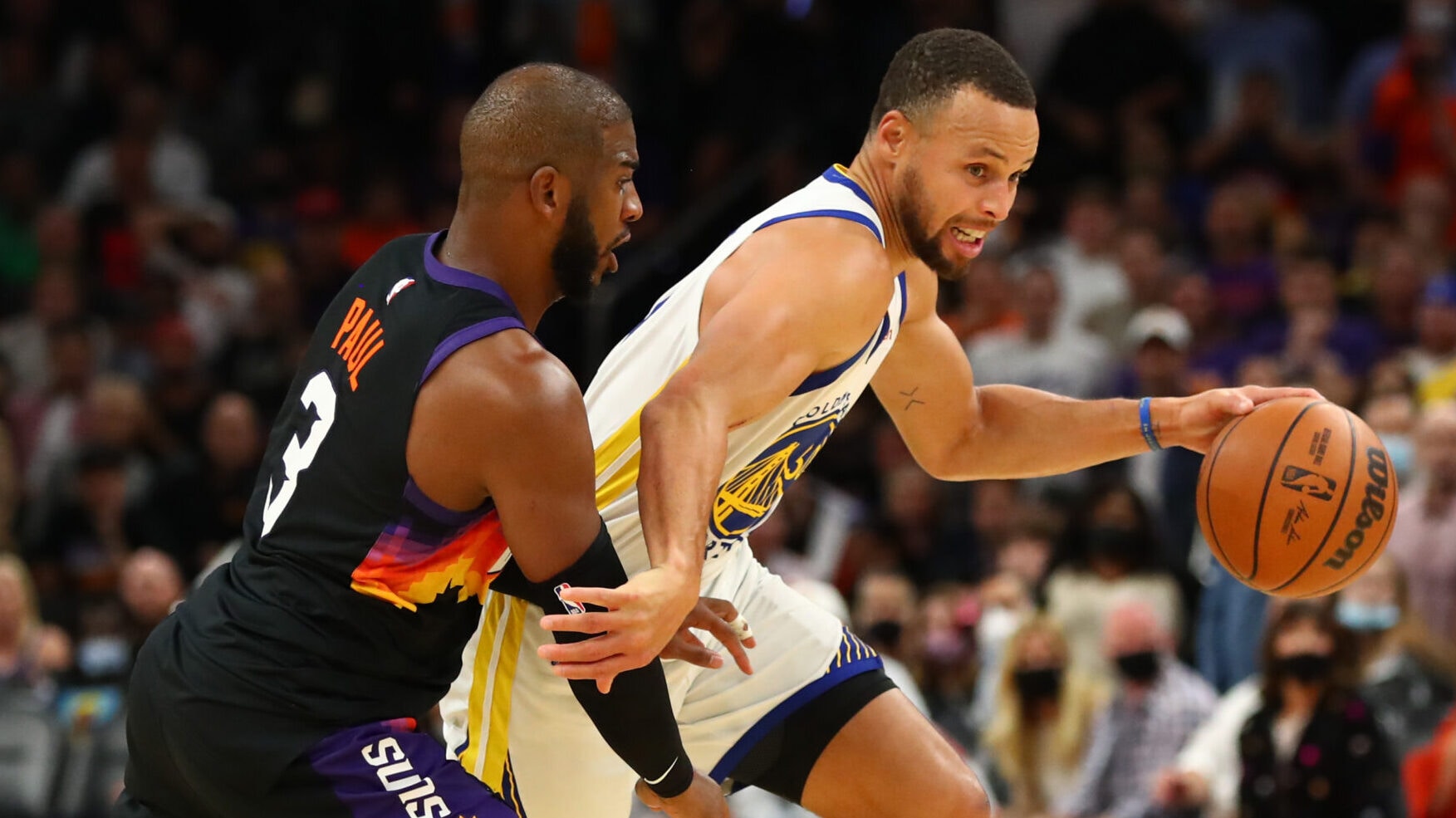
The Suns re-signed Deandre Ayton (right) and extended Devin Booker’s deal this offseason.
Phoenix Suns
2021-22 record: 64-18
Key additions: Damion Lee, Josh Okogie (free agency)
Key subtractions: JaVale McGee, Frank Kaminsky, Aaron Holiday (free agency)
Last season: After ripping through the season with an NBA-best 64 wins, the Suns were surprisingly vulnerable and lame in the playoffs, and their issues came almost without warning. They were first staggered by the New Orleans Pelicans (who were without Zion Williamson) in the first round, then got floored by the Dallas Mavericks in the semifinals. It qualified as an upset because the Suns had more depth and talent but ultimately had no answers in that seven-game series. There was also an undercurrent of drama in Game 7: Center Deandre Ayton was benched all game after simmering all season because the Suns refused to extend him. Phoenix got solid results from All-Stars Devin Booker and Chris Paul, and Mikal Bridges made the All-Defensive first team, but a second straight NBA Finals trip wasn’t in the works.
Summer summary: It was all for naught. It fizzled. It was ultimately much ado about nothing. It was the supposedly feisty stare-down and showdown between Ayton and the Suns over — what else — money, but Ayton got the bag, the Suns retained their gifted big man, everyone hugged it out and declared victory and moved on.
See? Nothing to see here.
A whole lot of @Suns today on NBA TV 📺🔥#TeamDays pic.twitter.com/0iC5wJcUfN
— NBA TV (@NBATV) September 3, 2022
The previous summer, the Suns refused to give Ayton the rookie max extension, so he felt offended. Forget that even if the Suns gave him an extension, it wouldn’t kick in until 2022-23. Forget that the overall NBA game has shifted away from low-post centers, who are devalued (unless you’re Joel Embiid). Forget that Ayton would probably be in demand anyway as a restricted free agent and get an offer (he did).
His feelings were hurt, and really, that was the only issue here.
This wasn’t as big a deal as it appeared. This was all about ego, because eventually business takes care of itself and players get what’s coming to them. The Suns wisely let the market dictate what Ayton would earn, and it did when the Pacers extended him a four-year, $133 million offer sheet … which the Suns matched. Ayton wanted a fifth year, but that wasn’t happening from the Suns’ end.
But he’s now insanely rich, and he’ll get another contract four years from now … so why all the drama?
Deandre Ayton is back in Phoenix after the Suns reportedly match Indiana's offer sheet, but the relationship will have to be repaired.
Everyone in the league knew the Suns would match any offer, which is why none initially bothered to tender one. It was a surprise when Indiana, of all teams, finally rolled the dice. Maybe it was more of a public relations move by the Pacers. They could at least show their fan base that an effort was made.
Re-signing Ayton was really the only offseason heavy-lifting necessary for the Suns. The Suns saw no need to shake up a team that, over the last two regular seasons, was more successful than anyone else. Why fix what isn’t broken?
Aside from Ayton’s deal, Booker got a four-year, $224 million max extension. But this was largely expected and a fairly simple “negotiation,” if you want to call it that. After all, Booker (who will turn 26 in October) finished fourth in Kia MVP voting and made first team All-NBA in 2021-22.
The only semi-concern is Paul creeping up in age and treadwear, although he looked pretty frisky last season and was third in assists per game (8.3). Besides, there was no point guard on the market worth pursuing.
Relive some of the best plays from Chris Paul last season.
Phoenix did lose McGee, who had a bounce-back campaign, to free agency. He’s a quality backup, but not irreplaceable. That’s because the Suns extended Bismack Biyombo, who was also solid off the bench and is younger (30) than McGee (34). The other changes were mostly minor: Lee and Okogie, who could play their way into decent rotational minutes.
Essentially, the Suns are prepared to run it back with a team that went to the NBA Finals one year (2020-21) and then won 64 games a season later. Very few teams have the luxury of forgoing wholesale changes, so in that sense, the Suns should count themselves as fortunate. With Ayton signed and happy, the Suns will bring a core that can match up with virtually any team.
But you wonder if Paul’s best chance at that elusive championship was lost over the last two seasons. One thing that is always certain: the competition in the West will be as thick as usual for Phoenix.
Up next: Cleveland Cavaliers | Previously: Sacramento Kings
> 30 teams in 30 days: Complete schedule
* * *
Shaun Powell has covered the NBA for more than 25 years. You can e-mail him here, find his archive here and follow him on Twitter.
The views on this page do not necessarily reflect the views of the NBA, its clubs or Turner Broadcasting.










